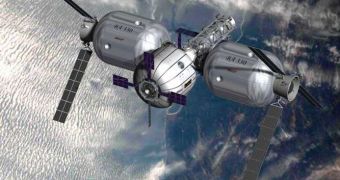On February 1, US President Barack Obama submitted the White House budget proposal for 2011 to the Congress. In it, it was stated that Project Constellation, NASA's current plan to go to the Moon by 2020, needed to be canceled, and more funding given to the private sector. The aim is to foster innovation, and to allow American astronauts to return to the low-Earth orbit faster than 2015, when the ARES I rocket was due to be rolled out. While many critic the new decision to sack the Project, some draw attention to the initiatives that may become a reality without it, Space reports.
One of the main areas for research will be the exploration of new space propulsion technologies. The goal is to significantly reduce travel times, and to enable explorers to move to the Moon, Mars and near-Earth Objects (NEO) faster than currently possible. “Imagine trips to Mars that take weeks instead of nearly a year; people fanning out across the inner solar system, exploring the moon, asteroids and Mars nearly simultaneously in a steady stream of firsts,” NASA Administrator Charles Bolden said recently, as he was presenting the agency's new directions of development.
Another idea that will receive some attention will be that related to space tourism, and even colonization. With the advent of new propulsion technologies, and more private space companies capable of sending people in suborbital flights, or even to the low-Earth orbit, hundreds and perhaps thousands could experience the wonders of flying in space. “Imagine enabling hundreds, even thousands of people to visit or live in low-Earth orbit, while NASA firmly focuses its gaze on the cosmic horizon beyond Earth,” Bolden added.
“I am excited to think that the development of commercial capabilities to send humans into low earth orbit will likely result in so many more earthlings being able to experience the transformative power of spaceflight,” famous astronaut Buzz Aldrin, a member of the Apollo 11 crew that landed on the Moon, shared. Some believe that space hotels, and even Moon resorts, may not be that far off.
The new approach to space exploration will also investigate the feasibility of constructing space-based gas stations. These facilities would allow spacecraft launched to the LEO to refuel after exiting the atmosphere, providing them with the extra fuel they need to reach more distant destinations, such as Mars and beyond. This would also decrease the costs of launch, as the ships being boosted to orbit would be much lighter than they currently are.
But what the new approach to space exploration is really striving for is fostering innovation in the private sector. NASA was not granted $1 billion to continue Project Constellation, but officials somehow found $6 billion to award the space agency for supporting private companies. California-based Space Exploration Technologies (SpaceX) and Orbital Sciences Corp., from Virginia, will be the main beneficiaries of this program. They already own $3.5 billion of NASA money in existing contracts.
“Because it's companies doing these things and they're competing against each other, the competition and fixed prices of contracts are going to drive a much higher level of efficiency and innovation than would have happened if the government just plodded along on its own,” Jim Bell, a planetary scientist at the Cornell University, in Ithaca, New York, explains. He is also the president of the non-profit, space-interested Planetary Society.

 14 DAY TRIAL //
14 DAY TRIAL //